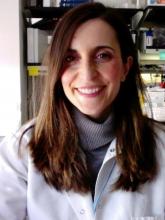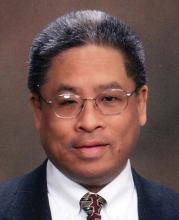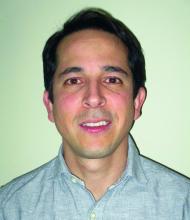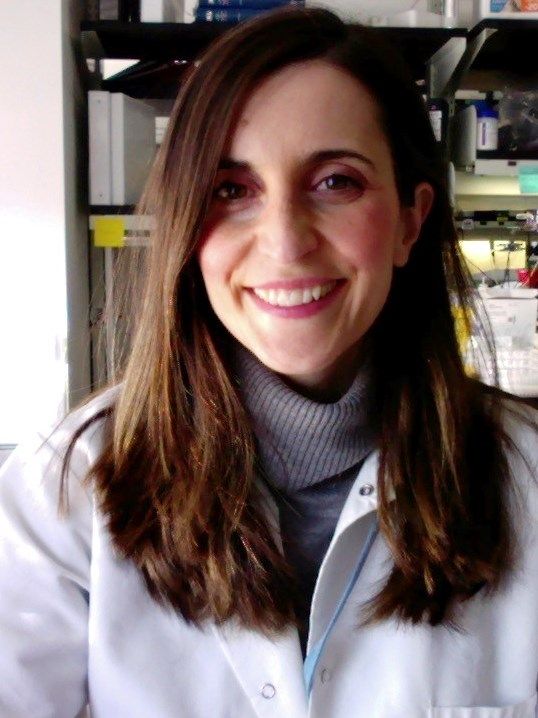User login
Thanks to the generosity of our donors, the AGA Research Foundation is cultivating the future of the GI community through research grants to talented investigators. The work and discoveries of AGA-funded recipients will open doors to new treatments and exciting new areas of knowledge.
The foundation has a proven track record of investing in researchers whose work has helped shape the field of gastroenterology. With your support, we are building a community of investigators. Here are just a few of the researchers the AGA Research Foundation is funding.
Silvia Affo, PhD
Columbia University
2017 AGA Research Scholar Award Recipient
“I am extremely grateful to be selected for this award. I would like to thank the AGA Research Foundation and foundation donors for their generous support. This award will help me to build a research program to better understand mechanisms that promote the growth of cholangiocarcinoma.” – Dr. Affo will use this research funding to address the role of cancer-associated fibroblasts in cholangiocarcinoma using novel research tools.
Gary Wu, MD
University of Pennsylvania
2017 AGA-Dannon Gut Microbiome in Health Award
“I am deeply honored to be the recipient of this award. The resources provided by this award will allow us to investigate models for small molecule generation by the gut microbiota that influence the plasma metabolome of the host. These models will be particularly important to understand the manner by which diet serves as a substrate for the gut microbiota to produce metabolites that ultimately have an impact on human health.” – Dr. Wu will use this research initiative grant to support his team’s continued exploration into the microbiome, which will have tremendous impact on the future of health care.
Jose Saenz, MD, PhD
Washington University School of Medicine
2017 AGA–Gastric Cancer Foundation Research Scholar Award in Gastric Cancer
“I am honored to be a recipient of this award. I would like to thank the AGA for their generous contribution that will fund a crucial transition in my career. I would equally like to thank the various mentors that have guided me through this process and have provided invaluable advice in pursuit of my goals. This award will provide support to further understand the host-microbial interactions that characterize Helicobacter pylori’s regional and glandular colonization of the stomach.” – Dr. Saenz notes that this award represents a commitment to studying early events in the preneoplastic cascade toward gastric adenocarcinoma, one of the leading causes of cancer-related deaths worldwide.
Donate today to help us continue to protect the GI research pipeline. Make a tax-deductible donation at www.gastro.org/donateonline.
Thanks to the generosity of our donors, the AGA Research Foundation is cultivating the future of the GI community through research grants to talented investigators. The work and discoveries of AGA-funded recipients will open doors to new treatments and exciting new areas of knowledge.
The foundation has a proven track record of investing in researchers whose work has helped shape the field of gastroenterology. With your support, we are building a community of investigators. Here are just a few of the researchers the AGA Research Foundation is funding.
Silvia Affo, PhD
Columbia University
2017 AGA Research Scholar Award Recipient
“I am extremely grateful to be selected for this award. I would like to thank the AGA Research Foundation and foundation donors for their generous support. This award will help me to build a research program to better understand mechanisms that promote the growth of cholangiocarcinoma.” – Dr. Affo will use this research funding to address the role of cancer-associated fibroblasts in cholangiocarcinoma using novel research tools.
Gary Wu, MD
University of Pennsylvania
2017 AGA-Dannon Gut Microbiome in Health Award
“I am deeply honored to be the recipient of this award. The resources provided by this award will allow us to investigate models for small molecule generation by the gut microbiota that influence the plasma metabolome of the host. These models will be particularly important to understand the manner by which diet serves as a substrate for the gut microbiota to produce metabolites that ultimately have an impact on human health.” – Dr. Wu will use this research initiative grant to support his team’s continued exploration into the microbiome, which will have tremendous impact on the future of health care.
Jose Saenz, MD, PhD
Washington University School of Medicine
2017 AGA–Gastric Cancer Foundation Research Scholar Award in Gastric Cancer
“I am honored to be a recipient of this award. I would like to thank the AGA for their generous contribution that will fund a crucial transition in my career. I would equally like to thank the various mentors that have guided me through this process and have provided invaluable advice in pursuit of my goals. This award will provide support to further understand the host-microbial interactions that characterize Helicobacter pylori’s regional and glandular colonization of the stomach.” – Dr. Saenz notes that this award represents a commitment to studying early events in the preneoplastic cascade toward gastric adenocarcinoma, one of the leading causes of cancer-related deaths worldwide.
Donate today to help us continue to protect the GI research pipeline. Make a tax-deductible donation at www.gastro.org/donateonline.
Thanks to the generosity of our donors, the AGA Research Foundation is cultivating the future of the GI community through research grants to talented investigators. The work and discoveries of AGA-funded recipients will open doors to new treatments and exciting new areas of knowledge.
The foundation has a proven track record of investing in researchers whose work has helped shape the field of gastroenterology. With your support, we are building a community of investigators. Here are just a few of the researchers the AGA Research Foundation is funding.
Silvia Affo, PhD
Columbia University
2017 AGA Research Scholar Award Recipient
“I am extremely grateful to be selected for this award. I would like to thank the AGA Research Foundation and foundation donors for their generous support. This award will help me to build a research program to better understand mechanisms that promote the growth of cholangiocarcinoma.” – Dr. Affo will use this research funding to address the role of cancer-associated fibroblasts in cholangiocarcinoma using novel research tools.
Gary Wu, MD
University of Pennsylvania
2017 AGA-Dannon Gut Microbiome in Health Award
“I am deeply honored to be the recipient of this award. The resources provided by this award will allow us to investigate models for small molecule generation by the gut microbiota that influence the plasma metabolome of the host. These models will be particularly important to understand the manner by which diet serves as a substrate for the gut microbiota to produce metabolites that ultimately have an impact on human health.” – Dr. Wu will use this research initiative grant to support his team’s continued exploration into the microbiome, which will have tremendous impact on the future of health care.
Jose Saenz, MD, PhD
Washington University School of Medicine
2017 AGA–Gastric Cancer Foundation Research Scholar Award in Gastric Cancer
“I am honored to be a recipient of this award. I would like to thank the AGA for their generous contribution that will fund a crucial transition in my career. I would equally like to thank the various mentors that have guided me through this process and have provided invaluable advice in pursuit of my goals. This award will provide support to further understand the host-microbial interactions that characterize Helicobacter pylori’s regional and glandular colonization of the stomach.” – Dr. Saenz notes that this award represents a commitment to studying early events in the preneoplastic cascade toward gastric adenocarcinoma, one of the leading causes of cancer-related deaths worldwide.
Donate today to help us continue to protect the GI research pipeline. Make a tax-deductible donation at www.gastro.org/donateonline.



